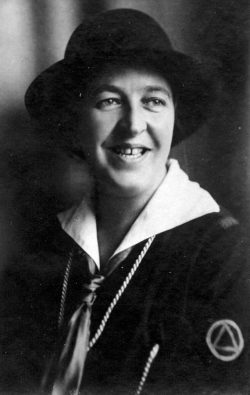
A young mother sat on a train, holding her baby girl in her lap. Nearby, another baby was being given the attention and admiration of the other passengers in the train. When the passengers turned to the weak, sickly baby held securely in her mother’s arms, they had nothing to say and turned their faces the other direction. The young mother, though at first stung by this obvious favoritism, looked lovingly at her child and hugged the baby close. “I wouldn’t exchange you for anyone in the whole world, you darling ugly baby with the beautiful eyes.”
Thus, from the very start, unconditional love and security was established in the heart of little Corrie ten Boom. Corrie started out life being born premature. The doctor predicted she would die. Corrie had three older siblings, Corrie’s parents had lost one other child already. But the ten Boom family poured all their love and prayers upon this “darling ugly baby,” and the baby flourished in the warmth of a joyful, God-fearing home.
The name of Jesus was repeated often and with joy and warmth in the home. Corrie’s father, Casper ten Boom, always prayed as if Jesus was right there listening. When Corrie was five years old, she was playing a make-believe game where she was knocking on the door of someone’s house, waiting for an answer. Her mother, observing her play, came and spoke to her. “Corrie, I know Someone who is standing at your door and knocking right now.”
Corrie stopped her play and looked at her mother in amazement. Her heart was ready for her mother’s next words, as if prepared by the Holy Spirit. Her mother continued, “Jesus said that He is standing at the door, and if you invite Him in He will come into your heart. Would you like to invite Jesus in?” “Yes, Mama,” Corrie replied earnestly, “I want Jesus in my heart.”
Theologians may differ on the correct terms for the process of salvation, but little Corrie was not thinking of theology that day – though her Father was a Calvinist who believed in predestination and her brother eventually became a theologian. At that moment, Jesus became more real to Corrie, and she came to Christ in faith – a faith that would grow steadily and surely over the many years of her life.
Corrie was a busy, happy girl growing up in “the Beje” on a cobblestone street in Holland. Her family was poor in money, but rich in family harmony and love for the Lord. Her father was a respected watchmaker and loved by all in the community. Casper ten Boom’s first interest in life was sharing the Gospel and the love of Jesus. Once, when money was very low, a customer came with cash in hand to buy an expensive watch. The customer complained about a bad watch he had bought from a younger watchmaker whose father had died and had taken over the business. Casper paused the transaction and asked to see the bad watch. He made a simple adjustment. “There, that was a very little mistake. It will be fine now.”
Corrie watched in horror as her father handed back the money and bowed as the customer walked out. “Corrie,” her father said, “you know I brought the Gospel at the burial of this young man’s father. What do you think that young man would have said when he heard that one of his good customers had gone to Mr. ten Boom? Do you think that the name of the Lord would be honored? There is blessed money and cursed money. Trust the Lord. He owns the cattle on a thousand hills and He will take care of us.”

From her Godly parents, Corrie learned by example what was most important in life. She tucked into her heart many Bible stories and songs that were frequently told and sung in the household. Corrie also learned to work hard, and to be kind and merciful to those less fortunate that herself.
She had many things to learn. Her older brother, William, was very smart and industrious in school. Her older sisters, Betsie and Nollie, were pretty, outgoing, organized, and well-mannered. But Corrie? She was awkward and shy and messy and full of mischief! Yet, she learned through daily life, sometimes in hard lessons, to overcome obstacles of character out of love for the people God had placed in her life to minister to.
Always, her father was teaching her through his encouraging counsel. When times were hard, he said, “Don’t forget, Corrie – underneath us are the everlasting arms. We won’t fall. God is a dwelling place. We have the promise of security when His arms are beneath us . . . holding us . . . supporting us . . . strengthening us.”
As she finished school and yearned to make her life useful, she found ways to be a servant to others. Every experience, though she little knew it at the time, was preparing her for the next work that God had for her to do. One remarkable area of her work that may not be as widely known was with people who were mentally ill. She was amazed at how spiritually receptive such people were. They couldn’t understand much – when she tried to show them a constellation of stars in the sky, they replied that the stars were only a bunch of “white beans.” But when it came to things of the Lord, His Spirit could penetrate even the confines of their mental illness. Even boys and girls with such limited minds could sing entire hymns, speak of Jesus, and gladly open their hearts to Him. Corrie’s father wisely said to her one day, “Corrie, what you do among these people is of little importance in the eyes of men, but I’m sure in God’s eyes it is the most valuable work of all.”
Her mother’s death was a sad blow to the family. She had suffered a stroke, and after that could not say more than a few words and make a few hand motions. This kind and gentle mother, who had cradled Corrie as a sickly baby, now received the gentle care of her three daughters for three years before being called to Heaven.

Corrie’s life, with its ups and downs that every family has, was a happy one, the love and security of her home and family unbroken. The great test of faith came during World War II. Jews in Holland were beginning to be sought and imprisoned and killed. The ten Boom family made the dangerous decision to work with the underground and help the Jewish people. As is well known from the book The Hiding Place, the ten Boom family was betrayed and the family members arrested. Old Casper ten Boom died after ten days in prison. Corrie and Betsie spent the next years in concentration camps, suffering from the cruel hands of the Nazis. Betsie died in the camp. Willem died soon after release. Only Corrie and Nollie survived the war.
When Corrie, now in her fifties, walked away from the concentration camp – released in fact by accident which was a miracle – her whole world was changed. She had no home to go to. All she had were the everlasting arms of the Lord to lean upon, and through Him, she learned to find security even when her circumstances were giving way beneath her. She learned forgiveness towards those who cruelly treated her. Eventually, she learned to share the Gospel with love and compassion to former Nazis just as she had to many boys and girls and the mentally ill in her hometown.
As Corrie’s father would often say, “When Jesus takes your hand He keeps you tight. When Jesus keeps you tight He leads you through life. When Jesus leads you through life He brings you safely home.”
Bibliography
In My Father’s House by Corrie ten Boom
The Hiding Place by Corrie ten Boom




